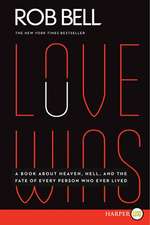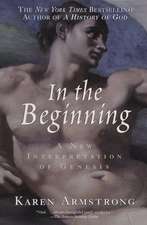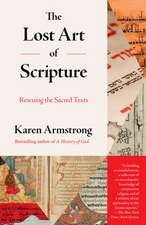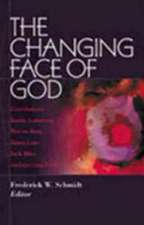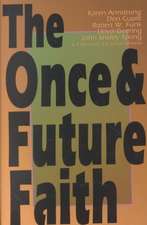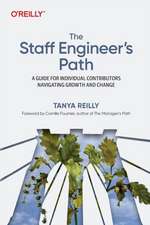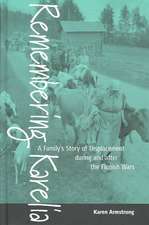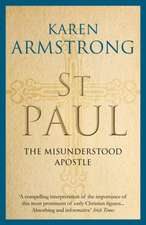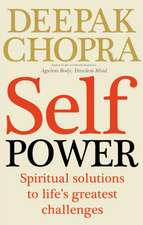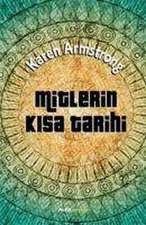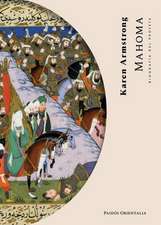The Spiral Staircase: My Climb Out of Darkness
Autor Karen Armstrongen Limba Engleză Paperback – 31 ian 2005 – vârsta de la 14 până la 18 ani
Vezi toate premiile Carte premiată
L.A. Times Book Prize (2004), Books for a Better Life (2004)
Preț: 88.25 lei
Nou
Puncte Express: 132
Preț estimativ în valută:
16.89€ • 18.34$ • 14.19£
16.89€ • 18.34$ • 14.19£
Carte indisponibilă temporar
Doresc să fiu notificat când acest titlu va fi disponibil:
Se trimite...
Preluare comenzi: 021 569.72.76
Specificații
ISBN-13: 9780385721271
ISBN-10: 0385721277
Pagini: 305
Dimensiuni: 132 x 198 x 20 mm
Greutate: 0.27 kg
Editura: Anchor Books
ISBN-10: 0385721277
Pagini: 305
Dimensiuni: 132 x 198 x 20 mm
Greutate: 0.27 kg
Editura: Anchor Books
Recenzii
“Enjoyable and deeply interesting. . . . Very rewarding.” –San Francisco Chronicle
“A story about becoming human, being recognized, finally recognizing oneself. . . . It fills the reader with hope.” –The Washington Post Book World
“Riveting. . . . It’s a pleasure to read simply because it’s honest and hopeful. . . . Armstrong is such an evocative writer.” –Newsday
“I loved this powerful and moving account, and read it nonstop.” –Elaine Pagels, author of Beyond Belief
“In . . . Armstrong’s memoir there lurks wisdom about the making and remaking of a life . . . from which all of us could learn.” –The New York Times Book Review
“A powerful memoir. . . . Buoyed by keen intelligence and unflinching self-awareness and honesty. . . . Armstrong is an engaging, energetic writer.” –The Christian Science Monitor
“A minor masterpiece.” –Elle
“Exceptionally impressive. . . . Karen Armstrong’s account of her spiralling journey provokes thought and inspires respect.” –Daily Telegraph
“The story of the making of a writer. . . . It manages to dramatize the writer’s process of intellectual development and to find in it genuine interest, and, indeed, suspense. . . . As an account of the intellectual journey of an intelligent and unique individual, the book is often gripping.” –San Francisco Chronicle
“Candid and compelling, and the sentences are flawless.” –The Dallas Morning News
“Unputdownable–absorbing, moving.” –Daily Mail
“Remarkable. . . . Unflinching. . . . This candid memoir will clarify thinking about the search for the sacred.” –Booklist
“Gripping. . . . Uplifting. . . . Utterly compelling.” –The Edmonton Journal
“Armstrong writes with sensitivity and wisdom. . . . She employs a breadth of learning that reflects the scintillating, shifting light and shade of human experience.” –The Times (London)
“Absorbing. . . . Profoundly inspiring and engaging.” –Tallahassee Democrat
“An honest and affecting book.” –The Independent
“The Spiral Staircase . . . is great. Armstrong is a marvelous writer and her subject matter is meaty. Her subject is the meaning of life.” –Deseret Morning News
“Open and accessible, Armstrong manages to put into words something that most of us cannot express.” –New Statesman
“Moving, insightful. . . . Compulsively readable.” –Library Journal
“A subtle and funny memoir.” –Sunday Telegraph
“A story about becoming human, being recognized, finally recognizing oneself. . . . It fills the reader with hope.” –The Washington Post Book World
“Riveting. . . . It’s a pleasure to read simply because it’s honest and hopeful. . . . Armstrong is such an evocative writer.” –Newsday
“I loved this powerful and moving account, and read it nonstop.” –Elaine Pagels, author of Beyond Belief
“In . . . Armstrong’s memoir there lurks wisdom about the making and remaking of a life . . . from which all of us could learn.” –The New York Times Book Review
“A powerful memoir. . . . Buoyed by keen intelligence and unflinching self-awareness and honesty. . . . Armstrong is an engaging, energetic writer.” –The Christian Science Monitor
“A minor masterpiece.” –Elle
“Exceptionally impressive. . . . Karen Armstrong’s account of her spiralling journey provokes thought and inspires respect.” –Daily Telegraph
“The story of the making of a writer. . . . It manages to dramatize the writer’s process of intellectual development and to find in it genuine interest, and, indeed, suspense. . . . As an account of the intellectual journey of an intelligent and unique individual, the book is often gripping.” –San Francisco Chronicle
“Candid and compelling, and the sentences are flawless.” –The Dallas Morning News
“Unputdownable–absorbing, moving.” –Daily Mail
“Remarkable. . . . Unflinching. . . . This candid memoir will clarify thinking about the search for the sacred.” –Booklist
“Gripping. . . . Uplifting. . . . Utterly compelling.” –The Edmonton Journal
“Armstrong writes with sensitivity and wisdom. . . . She employs a breadth of learning that reflects the scintillating, shifting light and shade of human experience.” –The Times (London)
“Absorbing. . . . Profoundly inspiring and engaging.” –Tallahassee Democrat
“An honest and affecting book.” –The Independent
“The Spiral Staircase . . . is great. Armstrong is a marvelous writer and her subject matter is meaty. Her subject is the meaning of life.” –Deseret Morning News
“Open and accessible, Armstrong manages to put into words something that most of us cannot express.” –New Statesman
“Moving, insightful. . . . Compulsively readable.” –Library Journal
“A subtle and funny memoir.” –Sunday Telegraph
Notă biografică
Karen Armstrong is the author of numerous other books on religious affairs, including A History of God, The Battle for God, Through the Narrow Gate, Holy War, Islam, and Buddha. Her work has been translated into forty languages. She is also the author of three television documentaries and took part in Bill Moyers’s television series Genesis. Since September 11, 2001, she has been a frequent contributor to conferences, panels, newspapers, periodicals, and throughout the media on both sides of the Atlantic on the subject of Islam. She lives in London.
Extras
1. Ash Wednesday
I was late. That in itself was a novelty. It was a dark, gusty evening in February 1969, only a few weeks after I had left the religious life, where we had practiced the most stringent punctuality. At the first sound of the convent bell announcing the next meal or a period of meditation in the chapel, we had to lay down our work immediately, stopping a conversation in the middle of a word or leaving the sentence we were writing half finished. The rule which governed our lives down to the smallest detail taught us that the bell should be regarded as the voice of God, calling each one of us to a fresh encounter, no matter how trivial or menial the task in hand. Each moment of our day was therefore a sacrament, because it was ordained by the religious order, which was in turn sanctioned by the church, the Body of Christ on Earth. So for years it had become second nature for me to jump to attention whenever the bell tolled, because it really was tolling for me. If I obeyed the rule of punctuality, I kept telling myself, one day I would develop an interior attitude of waiting permanently on God, perpetually conscious of his loving presence. But that had never happened to me.
When I had received the papers from the Vatican which dispensed me from my vows of poverty, chastity, and obedience, I was halfway through my undergraduate degree. I could, therefore, simply move into my college and carry on with my studies as though nothing had happened. The very next day, I was working on my weekly essay like any other Oxford student. I was study- ing English literature, and though I had been at university for nearly eighteen months, to be able to plunge heart and soul into a book was still an unbelievable luxury. Some of my superiors had regarded poetry and novels with suspicion, and saw literature as a form of self-indulgence, but now I could read anything I wanted; and during those first confusing weeks of my return to secular life, study was a source of delight and a real consolation for all that I had lost.
So that evening, when at 7:20 p.m., I heard the college bell summoning the students to dinner, I did not lay down my pen, close my books neatly, and walk obediently to the dining hall. My essay had to be finished in time for my tutorial the following morn- ing, and I was working on a crucial paragraph. There seemed no point in breaking my train of thought. This bell was not the voice of God, but simply a convenience. It was not inviting me to a meeting with God. Indeed, God was no longer calling me to anything at all — if he ever had. This time last year, even the smallest, most mundane job had had sacred significance. Now all that was over. Instead of each duty being a momentous occasion, nothing seemed to matter very much at all.
As I hurried across the college garden to the dining hall, I realized with a certain wry amusement that my little gesture of defiance had occurred on Ash Wednesday, the first day of Lent. That morning, the nuns had knelt at the altar rail to receive their smudge of ash, as the priest muttered: “Remember, man, that thou art dust and unto dust thou shalt return.” This memento mori began a period of religious observance that was even more intense than usual. Right now, in the convent refectory, the nuns would be lining up to perform special public penances in reparation for their faults. The sense of effort and determination to achieve a greater level of perfection than ever before would be almost tangible, and this was the day on which I had deliberately opted to be late for dinner!
As I pushed back the heavy glass door, I was confronted with a very different scene from the one I had just been imagining. The noise alone was an assault, as the unrestrained, babbling roar of four hundred students slapped me in the face. To encourage constant prayer and recollection, our rule had stipulated that we refrain from speech all day; talking was permitted only for an hour after lunch and after dinner, when the community gathered for sewing and general recreation. We were trained to walk quietly, to open and close doors as silently as possible, to laugh in a restrained trill, and if speech was unavoidable in the course of our duties, to speak only “a few words in a low voice.” Lent was an especially silent time. But there was no Lenten atmosphere in college tonight. Students hailed one another noisily across the room, yelled greetings to friends, and argued vigorously, with wild, exaggerated gestures. Instead of the monochrome convent scene — black-and-white habits, muffled, apologetic clinking of cutlery, and the calm, expressionless voice of the reader — there was a riot of color, bursts of exuberant laughter, and shouts of protest. But whether I liked it or not, this was my world now.
I am not quite sure of the reason for what happened next. It may have been that part of my mind was absent, still grappling with my essay, or that I was disoriented by the contrast between the convent scene I had been envisaging and the cheerful profanity of the spectacle in front of me. But instead of bowing briefly to the principal in mute apology for my lateness, as college etiquette demanded, I found to my horror that I had knelt down and kissed the floor.
This was the scene with which I opened Beginning the World, my first attempt to tell the story of my return to secular life. I realize that it presents me in a ridiculous and undignified light, but it still seems a good place to start, because it was a stark illustration of my plight. Outwardly I probably looked like any other student in the late 1960s, but I continued to behave like a nun. Unless I exerted constant vigilance, my mind, heart, and body betrayed me. Without giving it a second’s thought, I had instinctively knelt in the customary attitude of contrition and abasement. We always kissed the floor when we entered a room late and disturbed a community duty. This had seemed strange at first, but after a few weeks it had become second nature. Yet a quick glance at the girls seated at the tables next to the door, who were staring at me incredulously, reminded me that what was normal behavior in the convent was little short of deranged out here. As I rose to my feet, cold with embarrassment, I realized that my reactions were entirely different from those of most of my contemporaries in this strange new world. Perhaps they always would be.
But there may have been another reason why I kissed the ground that evening. Ever since my dispensation had come through, many of my fellow students and tutors had made a point of congratulating me. “You must be so relieved to be out of all that!” one of them had said. “It never seemed quite right for you.” “How exciting!” others had exclaimed. “You can start all over again! You can do anything, be anything you want to be! Everything is ahead of you!” It was true, in a sense: now I could fall in love, wear beautiful clothes, travel, make a lot of money — all the things that, most people presumed, I had been yearning to do for the past seven years. But I didn’t feel excited or relieved. I didn’t want to do any of the things that people expected. I had no sense of boundless opportunity. Instead I felt, quite simply, sad, and was constantly wracked by a very great regret. When I pictured that dedicated Lenten scene in the convent, it seemed unbearably poignant because it was now closed to me forever. I mourned the loss of an ideal and the absence of dedication from my new life, and I also had a nagging suspicion that if only I had tried just a little bit harder, I would not have had to leave. There had been something missing in me. I had failed to make a gift of myself to God. And so I felt like a penitent, and perhaps, when I kissed the floor that night, I had unconsciously wanted — just once — to appear in my true colors to the rest of the world.
In Beginning the World I described how I had threaded my way through the tables, flinching from the curious gaze of the other students, until I was rescued by a group who had become my friends and who had kept a kindly but tactful eye on me during the past difficult weeks. There was Rosemary, a cheerful extrovert, who was reading modern languages; Fiona, a gentler, more thoughtful girl; her constant companion, Pat, who had been a pupil at one of the boarding schools run by my order; and finally Jane, who was also reading English. All were Catholics. All had some experience of nuns. Jane retained a great fondness for the kindly semienclosed sisters at her rather exclusive school. Pat had actually known me as a nun, since I had been sent to help out at her school in Harrogate. There were other people at the table for whom Catholicism and convents were alien territory and who clearly intended to keep it that way. In Beginning the World I made them all tease me good-naturedly about my gaffe, question me about convent life, and express shock and horror at such customs as kissing the floor, confessing faults in public, and performing elaborate penances in the refectory. Maybe there was some discussion along these lines; certainly people were curious, up to a point. But I doubt that anybody was really very interested.
These young women had been quite wonderful to me. It had been Rosemary, Fiona, and Pat who had marched me down to Marks & Spencer a couple of hours after my dispensation had come through and helped me to buy my first secular clothes. Rosemary had cut and styled my hair, and all three had escorted me to dinner, my first public appearance as a defrocked nun. But they were probably wary of prying too closely into the reasons for what they could see had been a traumatic decision. I certainly had no desire to discuss the matter with them. In the convent we had been carefully trained never to tell our troubles to one another and it would never have occurred to me to unburden myself to my peers. And these girls had their own concerns. They too had essays to write; they were falling in love, and trying to juggle the demands of concentrated academic work with those of an absorbing social life. They were making their own journeys into adulthood, and now that the drama of my exodus was over, they almost certainly assumed that I was happily reveling in my new freedom, and were content to leave well alone.
I also knew that they could not begin to imagine my convent existence. Occasionally one of them would express astonishment if I inadvertently let something slip. “My nuns weren’t a bit like that!” Jane would insist stoutly. “Your lot must have been abnormally strict.” Pat would look even more bewildered, because she and I had lived with exactly the same community, but her perspective, as a secular, was different. “They were so modern and up-to-date, even sophisticated!” she would protest. “They drove cars, were starting to go to the cinema again, and were changing the habit!” Both girls would look at me reproachfully, because I was spoiling a cherished memory. Nobody likes to be told that things were not as they imagined. But I was quite certain that my own order had not been particularly austere, and agreed with Pat that it had been far more enlightened than many. Most nuns had observed these arcane rituals, had kissed the ground, confessed their external faults to one another, and were forbidden to have what were known as “particular friendships,” since all love must be given to God. That was why the reforms of the Second Vatican Council were so necessary.
From the Hardcover edition.
I was late. That in itself was a novelty. It was a dark, gusty evening in February 1969, only a few weeks after I had left the religious life, where we had practiced the most stringent punctuality. At the first sound of the convent bell announcing the next meal or a period of meditation in the chapel, we had to lay down our work immediately, stopping a conversation in the middle of a word or leaving the sentence we were writing half finished. The rule which governed our lives down to the smallest detail taught us that the bell should be regarded as the voice of God, calling each one of us to a fresh encounter, no matter how trivial or menial the task in hand. Each moment of our day was therefore a sacrament, because it was ordained by the religious order, which was in turn sanctioned by the church, the Body of Christ on Earth. So for years it had become second nature for me to jump to attention whenever the bell tolled, because it really was tolling for me. If I obeyed the rule of punctuality, I kept telling myself, one day I would develop an interior attitude of waiting permanently on God, perpetually conscious of his loving presence. But that had never happened to me.
When I had received the papers from the Vatican which dispensed me from my vows of poverty, chastity, and obedience, I was halfway through my undergraduate degree. I could, therefore, simply move into my college and carry on with my studies as though nothing had happened. The very next day, I was working on my weekly essay like any other Oxford student. I was study- ing English literature, and though I had been at university for nearly eighteen months, to be able to plunge heart and soul into a book was still an unbelievable luxury. Some of my superiors had regarded poetry and novels with suspicion, and saw literature as a form of self-indulgence, but now I could read anything I wanted; and during those first confusing weeks of my return to secular life, study was a source of delight and a real consolation for all that I had lost.
So that evening, when at 7:20 p.m., I heard the college bell summoning the students to dinner, I did not lay down my pen, close my books neatly, and walk obediently to the dining hall. My essay had to be finished in time for my tutorial the following morn- ing, and I was working on a crucial paragraph. There seemed no point in breaking my train of thought. This bell was not the voice of God, but simply a convenience. It was not inviting me to a meeting with God. Indeed, God was no longer calling me to anything at all — if he ever had. This time last year, even the smallest, most mundane job had had sacred significance. Now all that was over. Instead of each duty being a momentous occasion, nothing seemed to matter very much at all.
As I hurried across the college garden to the dining hall, I realized with a certain wry amusement that my little gesture of defiance had occurred on Ash Wednesday, the first day of Lent. That morning, the nuns had knelt at the altar rail to receive their smudge of ash, as the priest muttered: “Remember, man, that thou art dust and unto dust thou shalt return.” This memento mori began a period of religious observance that was even more intense than usual. Right now, in the convent refectory, the nuns would be lining up to perform special public penances in reparation for their faults. The sense of effort and determination to achieve a greater level of perfection than ever before would be almost tangible, and this was the day on which I had deliberately opted to be late for dinner!
As I pushed back the heavy glass door, I was confronted with a very different scene from the one I had just been imagining. The noise alone was an assault, as the unrestrained, babbling roar of four hundred students slapped me in the face. To encourage constant prayer and recollection, our rule had stipulated that we refrain from speech all day; talking was permitted only for an hour after lunch and after dinner, when the community gathered for sewing and general recreation. We were trained to walk quietly, to open and close doors as silently as possible, to laugh in a restrained trill, and if speech was unavoidable in the course of our duties, to speak only “a few words in a low voice.” Lent was an especially silent time. But there was no Lenten atmosphere in college tonight. Students hailed one another noisily across the room, yelled greetings to friends, and argued vigorously, with wild, exaggerated gestures. Instead of the monochrome convent scene — black-and-white habits, muffled, apologetic clinking of cutlery, and the calm, expressionless voice of the reader — there was a riot of color, bursts of exuberant laughter, and shouts of protest. But whether I liked it or not, this was my world now.
I am not quite sure of the reason for what happened next. It may have been that part of my mind was absent, still grappling with my essay, or that I was disoriented by the contrast between the convent scene I had been envisaging and the cheerful profanity of the spectacle in front of me. But instead of bowing briefly to the principal in mute apology for my lateness, as college etiquette demanded, I found to my horror that I had knelt down and kissed the floor.
This was the scene with which I opened Beginning the World, my first attempt to tell the story of my return to secular life. I realize that it presents me in a ridiculous and undignified light, but it still seems a good place to start, because it was a stark illustration of my plight. Outwardly I probably looked like any other student in the late 1960s, but I continued to behave like a nun. Unless I exerted constant vigilance, my mind, heart, and body betrayed me. Without giving it a second’s thought, I had instinctively knelt in the customary attitude of contrition and abasement. We always kissed the floor when we entered a room late and disturbed a community duty. This had seemed strange at first, but after a few weeks it had become second nature. Yet a quick glance at the girls seated at the tables next to the door, who were staring at me incredulously, reminded me that what was normal behavior in the convent was little short of deranged out here. As I rose to my feet, cold with embarrassment, I realized that my reactions were entirely different from those of most of my contemporaries in this strange new world. Perhaps they always would be.
But there may have been another reason why I kissed the ground that evening. Ever since my dispensation had come through, many of my fellow students and tutors had made a point of congratulating me. “You must be so relieved to be out of all that!” one of them had said. “It never seemed quite right for you.” “How exciting!” others had exclaimed. “You can start all over again! You can do anything, be anything you want to be! Everything is ahead of you!” It was true, in a sense: now I could fall in love, wear beautiful clothes, travel, make a lot of money — all the things that, most people presumed, I had been yearning to do for the past seven years. But I didn’t feel excited or relieved. I didn’t want to do any of the things that people expected. I had no sense of boundless opportunity. Instead I felt, quite simply, sad, and was constantly wracked by a very great regret. When I pictured that dedicated Lenten scene in the convent, it seemed unbearably poignant because it was now closed to me forever. I mourned the loss of an ideal and the absence of dedication from my new life, and I also had a nagging suspicion that if only I had tried just a little bit harder, I would not have had to leave. There had been something missing in me. I had failed to make a gift of myself to God. And so I felt like a penitent, and perhaps, when I kissed the floor that night, I had unconsciously wanted — just once — to appear in my true colors to the rest of the world.
In Beginning the World I described how I had threaded my way through the tables, flinching from the curious gaze of the other students, until I was rescued by a group who had become my friends and who had kept a kindly but tactful eye on me during the past difficult weeks. There was Rosemary, a cheerful extrovert, who was reading modern languages; Fiona, a gentler, more thoughtful girl; her constant companion, Pat, who had been a pupil at one of the boarding schools run by my order; and finally Jane, who was also reading English. All were Catholics. All had some experience of nuns. Jane retained a great fondness for the kindly semienclosed sisters at her rather exclusive school. Pat had actually known me as a nun, since I had been sent to help out at her school in Harrogate. There were other people at the table for whom Catholicism and convents were alien territory and who clearly intended to keep it that way. In Beginning the World I made them all tease me good-naturedly about my gaffe, question me about convent life, and express shock and horror at such customs as kissing the floor, confessing faults in public, and performing elaborate penances in the refectory. Maybe there was some discussion along these lines; certainly people were curious, up to a point. But I doubt that anybody was really very interested.
These young women had been quite wonderful to me. It had been Rosemary, Fiona, and Pat who had marched me down to Marks & Spencer a couple of hours after my dispensation had come through and helped me to buy my first secular clothes. Rosemary had cut and styled my hair, and all three had escorted me to dinner, my first public appearance as a defrocked nun. But they were probably wary of prying too closely into the reasons for what they could see had been a traumatic decision. I certainly had no desire to discuss the matter with them. In the convent we had been carefully trained never to tell our troubles to one another and it would never have occurred to me to unburden myself to my peers. And these girls had their own concerns. They too had essays to write; they were falling in love, and trying to juggle the demands of concentrated academic work with those of an absorbing social life. They were making their own journeys into adulthood, and now that the drama of my exodus was over, they almost certainly assumed that I was happily reveling in my new freedom, and were content to leave well alone.
I also knew that they could not begin to imagine my convent existence. Occasionally one of them would express astonishment if I inadvertently let something slip. “My nuns weren’t a bit like that!” Jane would insist stoutly. “Your lot must have been abnormally strict.” Pat would look even more bewildered, because she and I had lived with exactly the same community, but her perspective, as a secular, was different. “They were so modern and up-to-date, even sophisticated!” she would protest. “They drove cars, were starting to go to the cinema again, and were changing the habit!” Both girls would look at me reproachfully, because I was spoiling a cherished memory. Nobody likes to be told that things were not as they imagined. But I was quite certain that my own order had not been particularly austere, and agreed with Pat that it had been far more enlightened than many. Most nuns had observed these arcane rituals, had kissed the ground, confessed their external faults to one another, and were forbidden to have what were known as “particular friendships,” since all love must be given to God. That was why the reforms of the Second Vatican Council were so necessary.
From the Hardcover edition.
Descriere
The moving story of her own search for God by the highly-acclaimed author of the bestselling "A History of God: The 4,000-Year Quest of Judaism, Christianity and Islam."
Premii
- L.A. Times Book Prize Finalist, 2004
- Books for a Better Life Finalist, 2004


